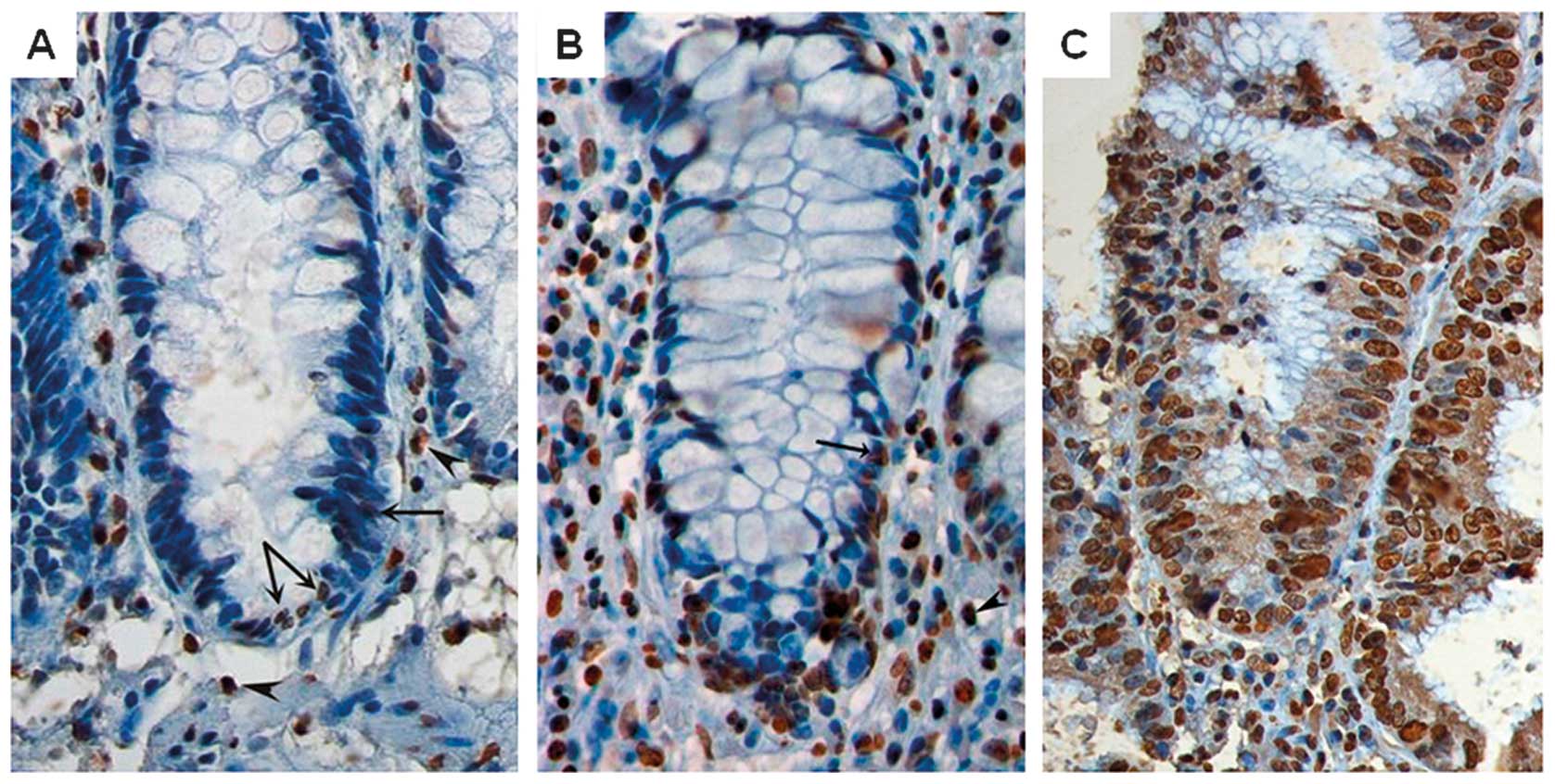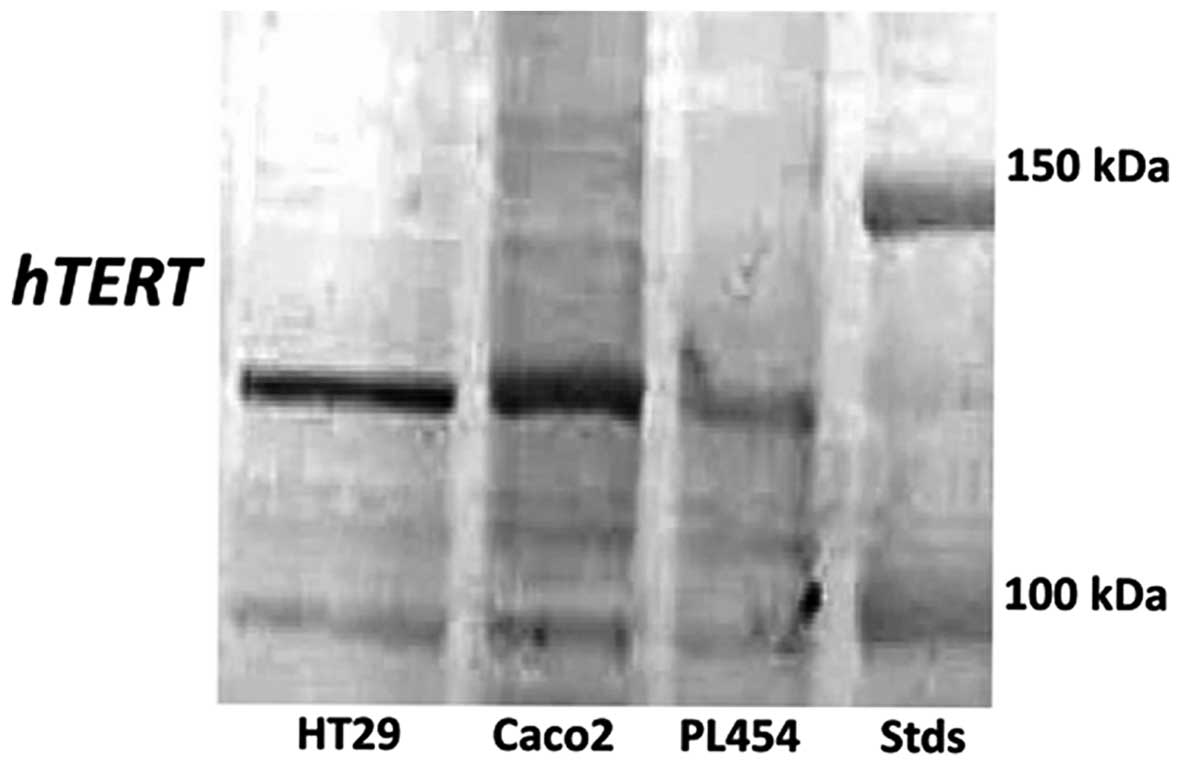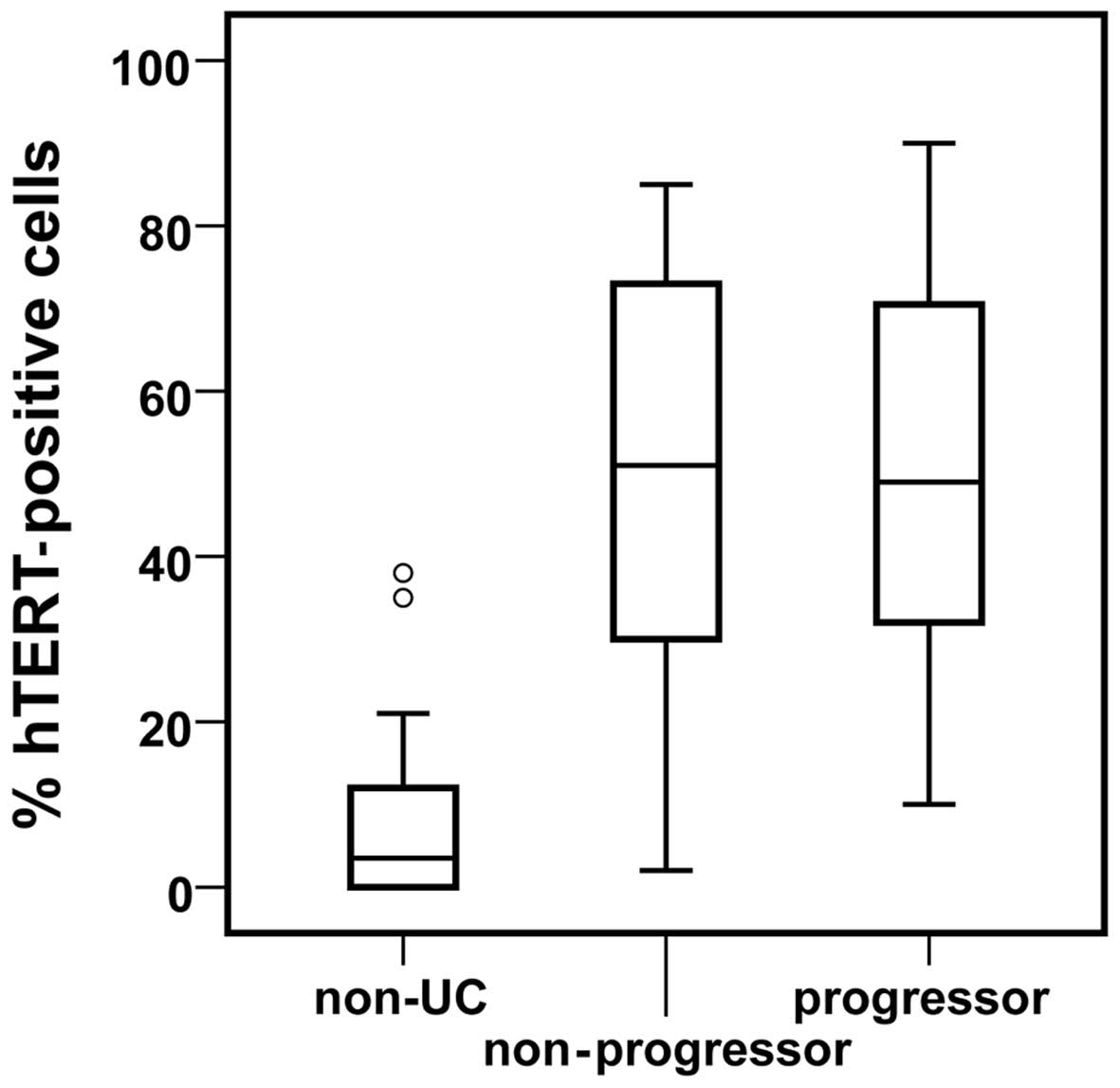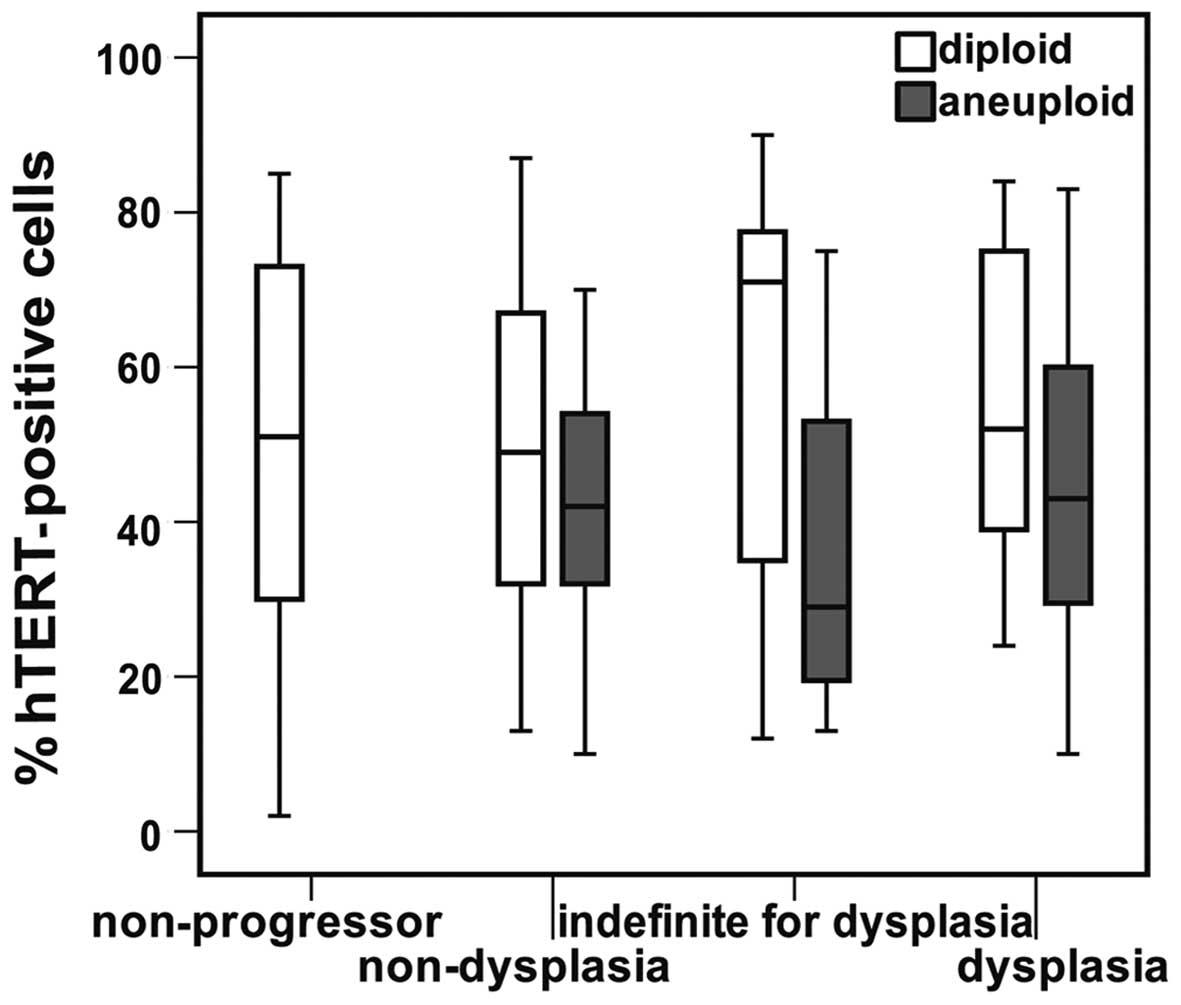|
1
|
Macdougall IP: The Cancer risk in
ulcerative colitis. Lancet. 2:655–658. 1964. View Article : Google Scholar : PubMed/NCBI
|
|
2
|
Eaden JA, Abrams KR and Mayberry JF: The
risk of colorectal cancer in ulcerative colitis: a meta-analysis.
Gut. 48:526–535. 2001. View Article : Google Scholar : PubMed/NCBI
|
|
3
|
Mathy C, Schneider K, Chen YY, Varma M,
Terdiman JP and Mahadevan U: Gross versus microscopic pancolitis
and the occurrence of neoplasia in ulcerative colitis. Inflamm
Bowel Dis. 9:351–355. 2003. View Article : Google Scholar : PubMed/NCBI
|
|
4
|
Gorfine SR, Bauer JJ, Harris MT and Kreel
I: Dysplasia complicating chronic ulcerative colitis: is immediate
colectomy warranted? Dis Colon Rectum. 43:1575–1581. 2000.
View Article : Google Scholar : PubMed/NCBI
|
|
5
|
Stenoien DL, Sen S, Mancini MA and
Brinkley BR: Dynamic association of a tumor amplified kinase,
Aurora-A, with the centrosome and mitotic spindle. Cell Motil
Cytoskeleton. 55:134–146. 2003. View
Article : Google Scholar : PubMed/NCBI
|
|
6
|
Hammarberg C, Slezak P and Tribukait B:
Early detection of malignancy in ulcerative colitis. A
flow-cytometric DNA study. Cancer. 53:291–295. 1984. View Article : Google Scholar : PubMed/NCBI
|
|
7
|
Meyer KF, Nause SL, Freitag-Wolf S, et al:
Aneuploidy characterizes adjacent non-malignant mucosa of
ulcerative colitis-associated but not sporadic colorectal
carcinomas: a matched-pair analysis. Scand J Gastroenterol.
48:679–687. 2013. View Article : Google Scholar
|
|
8
|
Fozard JB, Quirke P, Dixon MF, Giles GR
and Bird CC: DNA aneuploidy in ulcerative colitis. Gut.
27:1414–1418. 1986. View Article : Google Scholar : PubMed/NCBI
|
|
9
|
Meling GI, Clausen OP, Bergan A,
Schjølberg A and Rognum TO: Flow cytometric DNA ploidy pattern in
dysplastic mucosa, and in primary and metastatic carcinomas in
patients with longstanding ulcerative colitis. Br J Cancer.
64:339–344. 1991. View Article : Google Scholar : PubMed/NCBI
|
|
10
|
Gerling M, Nousiainen K, Hautaniemi S, et
al: Aneuploidy-associated gene expression signatures characterize
malignant transformation in ulcerative colitis. Inflamm Bowel Dis.
19:691–703. 2013. View Article : Google Scholar : PubMed/NCBI
|
|
11
|
Gerling M, Meyer KF, Fuchs K, et al: High
frequency of aneuploidy defines ulcerative colitis-associated
carcinomas: a comparative prognostic study to sporadic colorectal
carcinomas. Ann Surg. Jun:42010.(Epub ahead of print).
|
|
12
|
Sauerwald A, Sandin S, Cristofari G,
Scheres SH, Lingner J and Rhodes D: Structure of active dimeric
human telomerase. Nat Struct Mol Biol. 20:454–460. 2013. View Article : Google Scholar : PubMed/NCBI
|
|
13
|
Mukherjee S, Firpo EJ, Wang Y and Roberts
JM: Separation of telomerase functions by reverse genetics. Proc
Natl Acad Sci USA. 108:E1363–E1371. 2011. View Article : Google Scholar : PubMed/NCBI
|
|
14
|
Kim NW, Piatyszek MA, Prowse KR, et al:
Specific association of human telomerase activity with immortal
cells and cancer. Science. 266:2011–2015. 1994. View Article : Google Scholar : PubMed/NCBI
|
|
15
|
Chadeneau C, Hay K, Hirte HW, Gallinger S
and Bacchetti S: Telomerase activity associated with acquisition of
malignancy in human colorectal cancer. Cancer Res. 55:2533–2536.
1995.PubMed/NCBI
|
|
16
|
Shay JW and Bacchetti S: A survey of
telomerase activity in human cancer. Eur J Cancer. 33:787–791.
1997. View Article : Google Scholar : PubMed/NCBI
|
|
17
|
Hanahan D and Weinberg RA: Hallmarks of
cancer: the next generation. Cell. 144:646–674. 2011. View Article : Google Scholar : PubMed/NCBI
|
|
18
|
Baykal A, Rosen D, Zhou C, Liu J and Sahin
AA: Telomerase in breast cancer: a critical evaluation. Adv Anat
Pathol. 11:262–268. 2004. View Article : Google Scholar : PubMed/NCBI
|
|
19
|
Usselmann B, Newbold M, Morris AG and
Nwokolo CU: Deficiency of colonic telomerase in ulcerative colitis.
Am J Gastroenterol. 96:1106–1112. 2001. View Article : Google Scholar : PubMed/NCBI
|
|
20
|
Engelhardt M, Drullinsky P, Guillem J and
Moore MA: Telomerase and telomere length in the development and
progression of premalignant lesions to colorectal cancer. Clin
Cancer Res. 3:1931–1941. 1997.PubMed/NCBI
|
|
21
|
Kleideiter E, Friedrich U, Möhring A, et
al: Telomerase activity in chronic inflammatory bowel disease. Dig
Dis Sci. 48:2328–2332. 2003. View Article : Google Scholar : PubMed/NCBI
|
|
22
|
Risques RA, Lai LA, Himmetoglu C, et al:
Ulcerative colitis-associated colorectal cancer arises in a field
of short telomeres, senescence, and inflammation. Cancer Res.
71:1669–1679. 2011. View Article : Google Scholar : PubMed/NCBI
|
|
23
|
Holzmann K, Klump B, Weis-Klemm M, et al:
Telomerase activity in long-standing ulcerative colitis. Anticancer
Res. 20:3951–3955. 2000.PubMed/NCBI
|
|
24
|
Myung SJ, Yang SK, Chang HS, et al:
Clinical usefulness of telomerase for the detection of colon cancer
in ulcerative colitis patients. J Gastroenterol Hepatol.
20:1578–1583. 2005. View Article : Google Scholar : PubMed/NCBI
|
|
25
|
Burum-Auensen E, De Angelis PM, Schjølberg
AR, Røislien J, Andersen SN and Clausen OP: Spindle proteins Aurora
A and BUB1B, but not Mad2, are aberrantly expressed in dysplastic
mucosa of patients with longstanding ulcerative colitis. J Clin
Pathol. 60:1403–1408. 2007. View Article : Google Scholar : PubMed/NCBI
|
|
26
|
Salk JJ, Bansal A, Lai LA, et al: Clonal
expansions and short telomeres are associated with neoplasia in
early-onset, but not late-onset, ulcerative colitis. Inflamm Bowel
Dis. 19:2593–2602. 2013. View Article : Google Scholar : PubMed/NCBI
|
|
27
|
Risques RA, Lai LA, Brentnall TA, et al:
Ulcerative colitis is a disease of accelerated colon aging:
evidence from telomere attrition and DNA damage. Gastroenterology.
135:410–418. 2008. View Article : Google Scholar : PubMed/NCBI
|
|
28
|
Greco V, Lauro G, Fabbrini A and Torsoli
A: Histochemistry of the colonic epithelial mucins in normal
subjects and in patients with ulcerative colitis. A qualitative and
histophotometric investigation. Gut. 8:491–496. 1967. View Article : Google Scholar : PubMed/NCBI
|
|
29
|
Sipos F, Galamb O, Herszényi L, et al:
Elevated insulin-like growth factor 1 receptor, hepatocyte growth
factor receptor and telomerase protein expression in mild
ulcerative colitis. Scand J Gastroenterol. 43:289–298. 2008.
View Article : Google Scholar : PubMed/NCBI
|
|
30
|
Roessner A, Kuester D, Malfertheiner P and
Schneider-Stock R: Oxidative stress in ulcerative
colitis-associated carcinogenesis. Pathol Res Pract. 204:511–524.
2008. View Article : Google Scholar : PubMed/NCBI
|
|
31
|
O’Sullivan JN, Bronner MP, Brentnall TA,
et al: Chromosomal instability in ulcerative colitis is related to
telomere shortening. Nat Genet. 32:280–284. 2002.PubMed/NCBI
|
|
32
|
Lo AW, Sabatier L, Fouladi B, Pottier L,
Ricoul M and Murnane JP: DNA amplification by
breakage/fusion/bridge cycles initiated by spontaneous telomere
loss in a human cancer cell line. Neoplasia. 4:531–538. 2002.
View Article : Google Scholar : PubMed/NCBI
|
|
33
|
Hackett JA and Greider CW: Balancing
instability: dual roles for telomerase and telomere dysfunction in
tumorigenesis. Oncogene. 21:619–626. 2002. View Article : Google Scholar : PubMed/NCBI
|
|
34
|
Narducci ML, Grasselli A, Biasucci LM, et
al: High telomerase activity in neutrophils from unstable coronary
plaques. J Am Coll Cardiol. 50:2369–2374. 2007. View Article : Google Scholar : PubMed/NCBI
|
|
35
|
Wu YL, Dudognon C, Nguyen E, et al:
Immunodetection of human telomerase reverse-transcriptase (hTERT)
re-appraised: nucleolin and telomerase cross paths. J Cell Sci.
119:2797–2806. 2006. View Article : Google Scholar : PubMed/NCBI
|
|
36
|
Duarte MC, Babeto E, Leite KRM, et al:
Expression of TERT in precancerous gastric lesions compared to
gastric cancer. Braz J Med Biol Res. 44:100–104. 2011. View Article : Google Scholar : PubMed/NCBI
|
|
37
|
Simsek BC, Pehlivan S and Karaoglu A:
Human telomerase reverse transcriptase expression in colorectal
tumors: correlations with immunohistochemical expression and
clinicopathologic features. Ann Diagn Pathol. 14:413–417. 2010.
View Article : Google Scholar
|
|
38
|
Hiyama E, Hiyama K, Yokoyama T and Shay
JW: Immunohistochemical detection of telomerase (hTERT) protein in
human cancer tissues and a subset of cells in normal tissues.
Neoplasia. 3:17–26. 2001. View Article : Google Scholar : PubMed/NCBI
|
|
39
|
Friis-Ottessen M, Bendix L, Kølvraa S,
Norheim-Andersen S, De Angelis PM and Clausen OP: Telomere
shortening correlates to dysplasia but not to DNA aneuploidy in
longstanding ulcerative colitis. BMC Gastroenterol. 14:82014.
View Article : Google Scholar : PubMed/NCBI
|
|
40
|
Andersen SN, Rognum TO, Bakka A and
Clausen OP: Ki-67: a useful marker for the evaluation of dysplasia
in ulcerative colitis. Mol Pathol. 51:327–332. 1998. View Article : Google Scholar : PubMed/NCBI
|


















